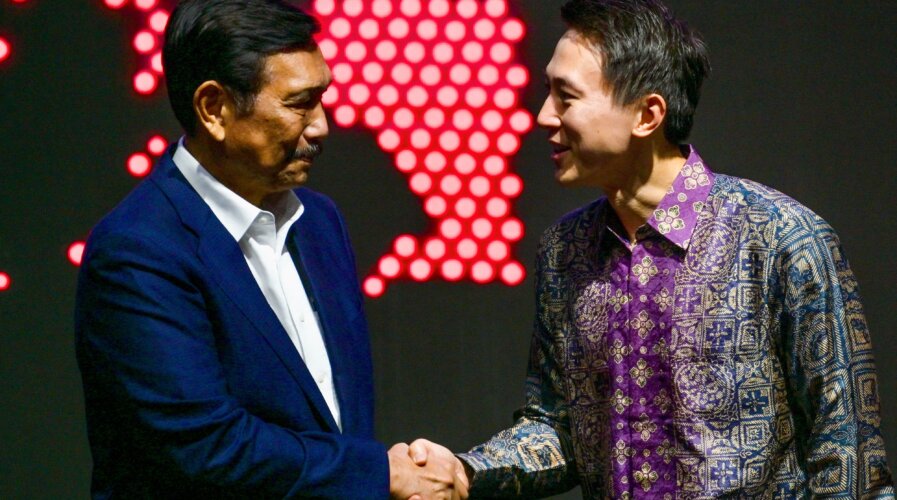
TikTok CEO Shou Zi Chew (R) shakes hands with Indonesian Coordinating Minister for Maritime Affairs and Investment Luhut Binsar Pandjaitan during the TikTok Southeast Asia Impact Forum 2023 in Jakarta, Indonesia on June 15, 2023.(Photo by BAY ISMOYO / AFP)
TikTok’s Project S hits a snag in Indonesia
|
Getting your Trinity Audio player ready... |
- Indonesia is concerned that Project S by TikTok would threaten the country’s microbusiness and small and medium-sized enterprises.
- Should it be made available, Project S could trigger a regulatory change to protect the interests of local MSMEs in Indonesia.
- TikTok is also in its early-stage talks with regulators to obtain a payments license in Indonesia.
It has been quite a momentous year so far for TikTok. The ByteDance-owned short videos app garnered global attention when its CEO endured a five-hour grilling in Capitol Hill about the safety and security of the viral app. Not too long after being pummeled by American lawmakers, TikTok expanded in Southeast Asia (SEA), especially Indonesia.
Political pushback and attempts to ban TikTok in the US partly explain the charm offensive TikTok has been on in SEA, where the nearly 700 million-strong population has become critical to its future success. Despite the growing chorus of bipartisan lawmakers viewing TikTok as a threat, the ByteDance-owned app has plans to “invest billions” in the Southeast Asian region.

TikTok CEO Shou Zi Chew delivers his opening speech during the TikTok Southeast Asia Impact Forum 2023 in Jakarta on June 15, 2023. (Photo by BAY ISMOYO / AFP)
Interestingly, according to CEO Shou Zi Chew, Indonesia alone was slated to receive US$10 billion in investment over the next five years. The short-form video giant’s ulterior motive is to dominate e-commerce in the region. Considering growing regulatory scrutiny in the US — the biggest market for the app with 116 million users — TikTok has been investing more in its second-biggest market: Indonesia, which had 113 million app users as of April, according to Statista.
Outside Indonesia, it’s also ramping up its focus on Thailand and Malaysia. “We see our growth opportunity here to be immense, and we look forward to investing more in this country (Indonesia) and, of course, in the region,” Chew said, noting that the company had close to 2,000 employees in the archipelago.
The focus for TikTok in Southeast Asia currently revolves around Project S – a new social commerce feature that opens up a new section on the TikTok app titled Trendy Beat. What that essentially means, according to the Financial Times, is that items that go viral on videos may be algorithmically selected and marketed for sale in the section. TikTok’s parent company, ByteDance, will work with a network of China-based suppliers to fulfill item orders.
The feature is currently in development and undergoing testing in the UK market. But it is a challenging journey for ByteDance in Asia as the company has been facing sharpening scrutiny. There have been Southeast Asian authorities criticizing the content of TikTok this year, with Vietnam announcing a review of the app.
The company has already been banned in India, another huge market that would have otherwise held an enormous opportunity for TikTok.
How is TikTok preparing to dominate Indonesia?
While TikTok is a veritable behemoth, its e-commerce platform TikTok Shop is a relatively small player in the Indonesian e-commerce market. However, TikTok’s new initiative, Project S, has attracted attention in the Southeast Asian nation.
Firstly, it is essential to grasp that for TikTok, Indonesia is the most critical market in the region for TikTok shops. For context, in 2022, it recorded a gross merchandise value (GMV) of US$2.5 billion from the country, according to a report by venture builder Momentum Works.
Unfortunately, Indonesia’s government views Project S as threatening local MSMEs. Teten Masduki, Indonesia’s minister for cooperatives and SMEs, believes that if the project is introduced, it could put local MSMEs under pressure in an already-saturated market. Masduki believes that the TikTok initiative is suspected of gathering data on popular products in Indonesia and producing similar products in China for domestic sale at lower prices.
The minister even went as far as to suggest a regulatory change to protect the interests of local MSMEs in Indonesia. He urges Indonesia’s Ministry of Trade to revise Regulation No. 50 of 2020 (Reg 50/2020), which regulates e-commerce trade, to also apply to social commerce. So far, TikTok’s Indonesia office told Tech in Asia that Project S is unavailable in the country, emphasizing that the firm does not operate a cross-border business.
TikTok Indonesia’s head of communications, Anggini Setiawan, said the Cooperatives and SMEs Ministry had granted her company the opportunity to explain Project S further on July 26. “We have briefed the ministry and would like to set the record straight on the misinformation concerning TikTok Shop in the media and online. It is not true that we will launch a cross-border initiative in Indonesia,” Anggini told reporters.
She emphasized that TikTok “do not intend to create our e-commerce products or become a wholesaler that will compete with Indonesian sellers.” However, she iterated how the TikTok Shop model for the Indonesian market was tailored to empower and benefit local sellers, “and we will continue to use it.”
Separately, there had been talks that TikTok is in early-stage discussions with regulators to obtain a payments license in Indonesia. Two sources briefed on the plan said TikTok, owned by Chinese tech giant ByteDance, was in talks with Indonesia’s central bank and that the application was being viewed favorably.
The spokesperson for TikTok confirmed with Reuters on August 4 that the talks were taking place, adding that an Indonesian payments license would help local creators and sellers on its platform. We will have to wait and watch how it plays out for TikTok in Indonesia, the app’s most promising country in the region.
READ MORE
- Safer Automation: How Sophic and Firmus Succeeded in Malaysia with MDEC’s Support
- Privilege granted, not gained: Intelligent authorization for enhanced infrastructure productivity
- Low-Code produces the Proof-of-Possibilities
- New Wearables Enable Staff to Work Faster and Safer
- Experts weigh in on Oracle’s departure from adland


